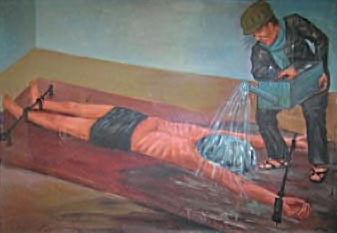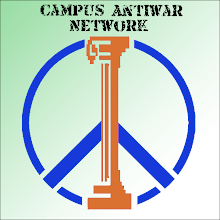The latter argument is quite problematic. The argument is that by disrupting people's lives, protesters or those partaking in a direct action alienate people who may be sympathetic to their goals or messag
 e. However, it is equally likely that people who would not have otherwise known about the protest, or might not have normally joined, might join in the protest. Speaking empirically, at the Chicago march on Wednesday, March 19, I was personally able to bring three or four people into the march from the sidelines. When I asked a pair of girls to join, they seemed surprised. "Oh, can we?" they asked, and when I told them that they could (and should), they willingly joined the group. If this were repeated down Michigan Avenue, as I have no doubt that it was, the march would have swelled from the just the people at at Federal Plaza to an even larger size as people from the sidelines joined in. Thus, the cost of alienating some people must be weighed against the benefit of having new people join the movement.
e. However, it is equally likely that people who would not have otherwise known about the protest, or might not have normally joined, might join in the protest. Speaking empirically, at the Chicago march on Wednesday, March 19, I was personally able to bring three or four people into the march from the sidelines. When I asked a pair of girls to join, they seemed surprised. "Oh, can we?" they asked, and when I told them that they could (and should), they willingly joined the group. If this were repeated down Michigan Avenue, as I have no doubt that it was, the march would have swelled from the just the people at at Federal Plaza to an even larger size as people from the sidelines joined in. Thus, the cost of alienating some people must be weighed against the benefit of having new people join the movement.Additionally, protests and direct actions garner press attention. With the current state of the media, the antiwar movement needs all the media attention it can get. Before the 4,000 deaths and upsurge in violence in Iraq, the occupation had declined in both public opinion and media coverage. Thus, especially in times when the media is scarcely covering the war, protests serve an important role is brining it back to the forefront of the wider public's attention.
Along those lines, protests and direct actions serve as important symbolic ways to bring the war home. By interrupting the flow of normal life, protesters force people to confront the issue,
 something that rarely happens. This can prove effective, although one must be careful not to go overboard - the case of the "Holy Name 6" event which happened on Easter in Chicago. While I personally support these protesters, I feel that their actions might have caused more harm than good - although it certainly created great media attention and got people talking!
something that rarely happens. This can prove effective, although one must be careful not to go overboard - the case of the "Holy Name 6" event which happened on Easter in Chicago. While I personally support these protesters, I feel that their actions might have caused more harm than good - although it certainly created great media attention and got people talking!In answering common arguments against protesting, I have already begun stating benefits to protesting. It creates media attention, it creates discourse about the issues, and it forces people to confront the issue in a way that they normally are not forced to. Protesting does much more than just this, however.
Protesting can create tangible change. Public approval is critical for politicians, so they do pay attention when the people take to the streets. While national protests are the biggest, they also need to be, as they are, frankly, the least likely to actually create change. Local protests can easily create local change, and from these grassroots larger change can spread. This is not an argument against large national protests, however. National protests create national media attention, and can create large scale change. The important thing is to not be discouraged if a protest does not cause immediate change. We cannot think of the antiwar movement - or any movement of such a scale - in the short term. This is a long term struggle, and in it every protest is an important tool to the movement.
 Finally, protests can help curb the omnipresent problem of Burnout. In my experience, protests are some of the most invigorating thing that one can do. As long as one understand that protests are the means to a long term end, and not an end to themselves - and, importantly, as long as one understands that protests are unlikely to bring about immediate change - protests can be incredibly fun and extremely energizing. They give you a sense of your own power, both as an individual and as a group, and it allows people to see the size of the group. Often, activists are unable to see the "big picture" because of either geography or the nature of people - many are willing to take to the streets to protest, but not to the planning room to figure out the logistics. By immersing oneself in large groups, one can truly gain a sense of how powerful The People are.
Finally, protests can help curb the omnipresent problem of Burnout. In my experience, protests are some of the most invigorating thing that one can do. As long as one understand that protests are the means to a long term end, and not an end to themselves - and, importantly, as long as one understands that protests are unlikely to bring about immediate change - protests can be incredibly fun and extremely energizing. They give you a sense of your own power, both as an individual and as a group, and it allows people to see the size of the group. Often, activists are unable to see the "big picture" because of either geography or the nature of people - many are willing to take to the streets to protest, but not to the planning room to figure out the logistics. By immersing oneself in large groups, one can truly gain a sense of how powerful The People are.So, take to the streets. Be it a protest of 5, 50, 500, 5,000, or 500,000 - and I have been to a range similar to that - get out and take to the streets. Show them what Democracy looks like and show that what Democracy sounds like.
Whose Streets? Our Street. Whose War? Their War.








.png)